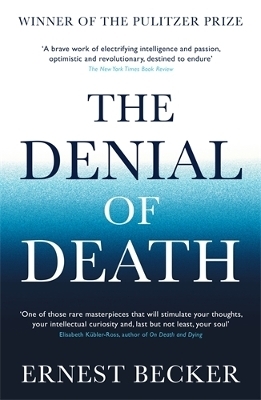
The Denial of Death
Seiten
2020
|
Main
Souvenir Press Ltd (Verlag)
978-1-78816-426-9 (ISBN)
Souvenir Press Ltd (Verlag)
978-1-78816-426-9 (ISBN)
Ernest Becker tackles our relationship to mortality and searches for alternative ways to live.
'It made me rethink the roots of our deepest fears and insecurities, and why we often disappoint ourselves in how we manifest them' Bill Clinton, Guardian
Winner of the Pulitzer Prize in 1974 and the culmination of a life's work, The Denial of Death is Ernest Becker's brilliant and impassioned answer to the 'why' of human existence. In bold contrast to the predominant Freudian school of thought, Becker tackles the problem of the vital lie - man's refusal to acknowledge his own mortality.
The book argues that human civilisation is a defence against the knowledge that we are mortal beings. Becker states that humans live in both the physical world and a symbolic world of meaning, which is where our 'immortality project' resides. We create in order to become immortal - to become part of something we believe will last forever. In this way we hope to give our lives meaning.
In The Denial of Death, Becker sheds new light on the nature of humanity and issues a call to life and its living that still resonates decades after it was written.
'It made me rethink the roots of our deepest fears and insecurities, and why we often disappoint ourselves in how we manifest them' Bill Clinton, Guardian
Winner of the Pulitzer Prize in 1974 and the culmination of a life's work, The Denial of Death is Ernest Becker's brilliant and impassioned answer to the 'why' of human existence. In bold contrast to the predominant Freudian school of thought, Becker tackles the problem of the vital lie - man's refusal to acknowledge his own mortality.
The book argues that human civilisation is a defence against the knowledge that we are mortal beings. Becker states that humans live in both the physical world and a symbolic world of meaning, which is where our 'immortality project' resides. We create in order to become immortal - to become part of something we believe will last forever. In this way we hope to give our lives meaning.
In The Denial of Death, Becker sheds new light on the nature of humanity and issues a call to life and its living that still resonates decades after it was written.
Ernest Becker was born in Massachusetts to Jewish immigrant parents. After completing military service, in which he served in the infantry and helped to liberate a Nazi concentration camp, he attended Syracuse University in New York. In his early 30s, he returned to Syracuse University to pursue graduate studies in cultural anthropology. The first of his nine books, Zen: A Rational Critique was published in 1961. He died in 1974 at the age of 49, two months before he was awarded the Pulitzer Prize for The Denial of Death.After his death, the Ernest Becker Foundation was founded, using Becker's ideas to support research in science, the humanities, social action and religion.
| Erscheinungsdatum | 17.04.2020 |
|---|---|
| Sprache | englisch |
| Maße | 126 x 196 mm |
| Gewicht | 228 g |
| Themenwelt | Sachbuch/Ratgeber ► Gesundheit / Leben / Psychologie ► Psychologie |
| Geisteswissenschaften ► Philosophie ► Erkenntnistheorie / Wissenschaftstheorie | |
| ISBN-10 | 1-78816-426-1 / 1788164261 |
| ISBN-13 | 978-1-78816-426-9 / 9781788164269 |
| Zustand | Neuware |
| Informationen gemäß Produktsicherheitsverordnung (GPSR) | |
| Haben Sie eine Frage zum Produkt? |
Mehr entdecken
aus dem Bereich
aus dem Bereich
Schulbuch Klassen 7/8 (G9)
Buch | Hardcover (2015)
Klett (Verlag)
CHF 29,90
Buch | Softcover (2004)
Cornelsen Verlag
CHF 23,90


